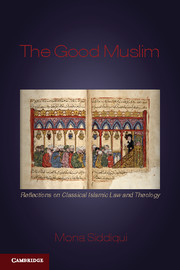Book contents
- Frontmatter
- Contents
- Acknowledgements
- Introduction
- 1 Spoken, Intended, and Problematic Divorce in Hanafī Fiqh
- 2 Between Person and Property: Slavery in Qudūrī’s Mukhtaṣar
- 3 Pig, Purity, and Permission in Mālikī Slaughter
- 4 Drinking and Drunkenness in Ibn Rushd
- 5 Islamic and Other Perspectives on Evil
- 6 The Language of Love in the Qur’ān
- 7 Virtue and Limits in the Ethics of Friendship
- Glossary
- Bibliography
- Index
- References
7 - Virtue and Limits in the Ethics of Friendship
Published online by Cambridge University Press: 05 July 2012
- Frontmatter
- Contents
- Acknowledgements
- Introduction
- 1 Spoken, Intended, and Problematic Divorce in Hanafī Fiqh
- 2 Between Person and Property: Slavery in Qudūrī’s Mukhtaṣar
- 3 Pig, Purity, and Permission in Mālikī Slaughter
- 4 Drinking and Drunkenness in Ibn Rushd
- 5 Islamic and Other Perspectives on Evil
- 6 The Language of Love in the Qur’ān
- 7 Virtue and Limits in the Ethics of Friendship
- Glossary
- Bibliography
- Index
- References
Summary
On that day friends will become enemies of each other, except for those who are righteous.
(Q43:67)Each friend represents a world in us, a world possibly not born until they arrive, and it is only by this meeting that a new world is born.
(Anaïs Nin)Growing up as Muslim in the United Kingdom, I have lived most of my life not thinking in any systematic way about the friendships or relationships I have formed outside those of my immediate family. Friendships just happened; sometimes they were good and sometimes they were short-lived. I grew up in a nuclear family with no near or distant relatives and less than a handful of trips to Pakistan where I was born. My social milieu was made up of British people largely of non-Muslim origin. My parents, who would be categorised as first-generation immigrants to the United Kingdom, were from educated backgrounds and in the main became friends with other middle-class Muslims. We socialised with them and their children were our peers. Yet, looking back on these years, I confess I never really forged what I would call true friendships with the children. My friends were people with whom I went to school, college, and then university. And today in my professional context my friends are still largely from non-Muslim backgrounds. They are nominal and practising Christians and Jews as well as agnostics and humanists. This has not happened through any deliberate intent but as a result of the nature of my employment, the environment where I work, and, consequently, the kind of people I meet. Many of these people have become friends in whom I choose to confide and put my trust.
- Type
- Chapter
- Information
- The Good MuslimReflections on Classical Islamic Law and Theology, pp. 167 - 196Publisher: Cambridge University PressPrint publication year: 2012



